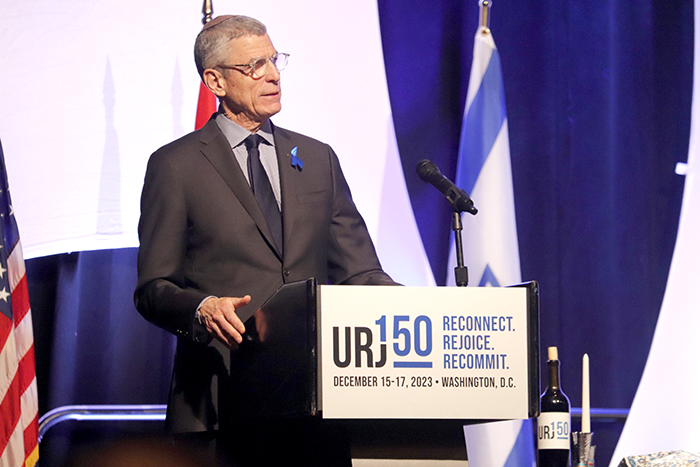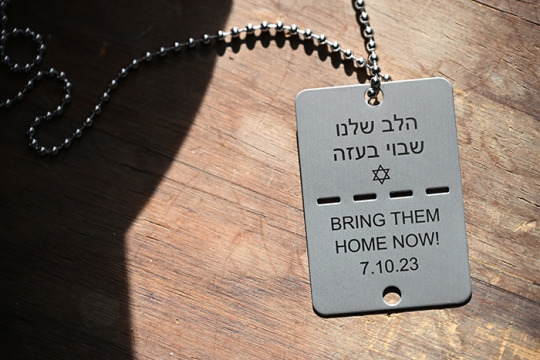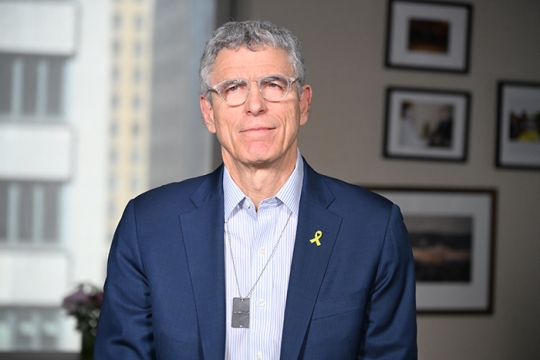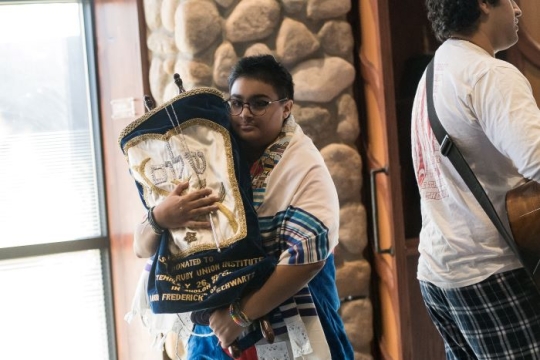Dreams and Nightmares: Facing the Future Together

Photo by Theo Hansen
In the summer of 1846, a 27-year-old rabbi named Isaac Mayer Wise left his home in Bohemia and traveled to the United States aboard the ship “Marie,” accompanied by his wife and baby daughter. On board, the family endured weeks in lice- and rat-infested steerage and kept kosher by consuming nothing but onions and herring which, for nostalgia’s sake, I argued we should serve as tonight’s Shabbat dinner...but sadly, I was overruled.
While crossing the Atlantic, Wise had a dream that his boat had crashed at the foot of a steep mountain where an army of “hollow-eyed, ghostly, grinning dwarfs, lascivious, ragged goblins,” and “tiny poodles” blocked his path. In his dream, our founder “dashed them aside” and reached a beautiful meadow at the summit, a harbinger of his new life in the New World (Isaac Mayer Wise, “Reminiscences,” 14-17).
Isaac Mayer Wise’s rosy dream needs no interpretation while Pharoah’s dreams in the opening of this week’s parashah, Miketz, are incomprehensible...that is, until a 30-year-old Joseph is brought from prison to quickly interpret the dreams of the Egyptian dictator.
Don’t worry, I didn’t come to D.C. to give an “I have a dream speech.” I think you’d agree that’s already been done brilliantly. But, like you, I’m more than a little curious about the vision that launched the URJ 150 years ago and what will inspire us for the journey ahead.
Our journey began with 28 congregational leaders meeting in Cincinnati in the summer of 1873 to establish the Union of American Hebrew Congregations (UAHC), now called the Union for Reform Judaism. And so, 150 years ago, the first of the Reform Jewish Movement’s founding institutions in North America was born.
It's worth remembering that the founders of our North American Reform Movement deliberately chose to emphasize the word “union” (the UNION of American Hebrew Congregations, Hebrew UNION College). Founded right after the Civil War, there was anything but unity in the United States or our congregations across the north/south divide. In the spirit of our prophetic tradition, our founders believed they could help heal what was broken in this nation.
Wise’s dream was to unify the American Jewish community. As you may know, he didn’t intend to create a separate Reform Movement, which is why the word Reform was not part of our original name.
His dream for the UAHC included orthodox and Reform Jews and everyone in between. Maybe if they had only served onions and herring at the graduation banquet of HUC’s first class of rabbis instead of all kinds of treif, just maybe, his dream would have been realized.
Here we are in D.C., not exactly the spiritual center of the known world. You might ask, “why are we celebrating our 150th anniversary here?” We’re surely not here to soak up the debilitating divisiveness of this town’s political establishment.
We gather here at this painful and precarious moment in Jewish history to celebrate the inspiring and impactful history of our Reform Movement on these shores and recommit ourselves to the larger mission that has seen us grow into what’s far and away the largest stream of North American Judaism. Our mission still calls us to lead the North American Jewish community.
It’s not an accident that we gather on Shabbat. Over the past 150 years, the URJ has never wavered from our core identity as a religious Movement that finds deep nourishment from our ever-evolving and joyful practice of Judaism.
We desperately need the spiritual fulfillment and renewal that being together in prayer, study, and celebration affords us at this dark time.
This Union of ours isn’t just communal, it’s also theological. Each time we study a sacred text, engage in a ritual, observe mitzvot, perform an act of chesed, or kindness, stand up for justice, or utter “Sh’ma Yisrael,” we affirm the oneness of humanity as we do the Oneness of God. Our holy work can unite us with the Divine.
Yes, there surely are times when our justice agenda has overlapped with D.C.’s and Ottawa’s political agendas. In part, this is a reflection of Judaism’s immense contributions to the growth of democracy and Reform Judaism’s broader sense of our religion’s prophetic obligation to be a moral goad to our societies. But politics is merely the means to do our social justice work; it is not the source of our holy work, which comes from a much deeper place.
Our commitment to climate justice, for instance, stems from our stewardship of God’s creation. The imperative didn’t start up the street in the House or the Senate, but rather in the opening chapters of Genesis. Most often, when we show up in D.C. or Ottawa, we are advocating as partners with the Holy One in shaping the world as it could be, as we believe God would want it to be. This weekend, we’ve come not to advocate but to reflect on those deeper sources; to step back and assess where we’ve been and where we’re going.
Just a few weeks ago, many of us stood proudly in D.C. with 290,000 fellow Jews from across the religious and political spectrum to express our love and support for the people and State of Israel at this perilous time. There were many issues that divided the marchers, but also something profound that united us. I stood near leaders who have demeaned our Reform Movement’s practice of Judaism and denigrated our liberal Zionist commitments – leaders who I have called out and condemned for such divisive and harmful statements.
But intentionally...in that moment...we chose to stand together.
Unity must have limits, however, which is why I still believe the organizers’ decision to ask Pastor John Hagee to speak was offensive and counter-productive to our cause and Israel’s cause. Yes, Israel has a shortage of friends and evangelical Christians have a place in the pro-Israel big tent -- but his theological antisemitism and homophobia should have disqualified him from addressing us.
Nonetheless, that day’s powerful gathering demonstrated that at key moments of great danger or opportunity we stand in solidarity with Am Yisrael, the Jewish people and the State of Israel. That’s what peoplehood is all about.
I hear questions about what we compromise or lose when we join in such a broad coalition. I hear the same questions when people ask how we can join in our progressive justice coalitions when there are groups who sharply criticize Israel or fail to denounce antisemitism as forcefully as we would want. Let me be clear: we cannot stand with those who incite violence against our people or any member of a marginalized community in our nations -- and never with those who call for the destruction of the Jewish State, but that still leaves the majority of interfaith and progressive organizations to partner with.
Those partnerships are oftentimes key to the achievement of social justice causes that make America a more just, more free, more compassionate, and more equitable nation -- traits which, in turn, are key to our own safety and well-being.
Indeed, as antisemitism has grown, so often our Jewish community has been enveloped by the love and support of our interfaith neighbors. Just this past June, when Temple Beth Israel of Macon, Georgia was getting ready for their Friday night services, Rabbi Liz Bahar looked out the window and saw neo-Nazis outside the building.
She reached out to Reform Movement leadership for help, and our Secure Community Network (SCN) partners kicked into high gear as law enforcement quickly arrived on the scene.
On Shabbat afternoon the following day, there was a spontaneous gathering outside the synagogue of the interfaith community of Macon, Georgia expressing their love and solidarity. Last month, after yet another Jewish building in Montreal was desecrated by a Molotov cocktail, leaders from the mayor to the prime minister spoke forcefully to condemn this antisemitic violence.
I doubt that the founders of the URJ imagined that in 150 years we’d be facing such a frightening wave of anti-Jewish hate, but we must act with courage and wisdom in defeating and diffusing the impact of such hate.
In the wake of Kristallnacht in 1938, almost no one stood with us; we were utterly alone as often has been the fate of beleaguered Jewish communities. How different the current landscape is, with governments around the world acting swiftly to provide protection to Jewish entities when antisemitism raises its head.
The U.S. government launched a “whole of government, whole of society” national strategy to combat antisemitism and stands in solidarity with the Jewish community – as it is now doing to address rising Islamophobia, as well. Think of the outpouring of solidarity and support offered to the whole Pittsburgh Jewish community, or Poway, or Colleyville after tragedy struck or threatened to strike so devastatingly.
When solidarity has been called for, we have not been alone. Even after October 7th, we were heartened by supportive words and actions from interfaith and social justice partners, even those with whom we have, in the past, disagreed about issues related to Israel. But we are deeply pained as well, that some of those we thought were allies have ghosted us at such a critical moment.
We will hold onto our dreams of a better world -- but we also have nightmares.
And we know this: Our future in North America will not be safe without effective advocacy for better protection of the Jewish community, nor will we be safe if any group can be subject to group hatred and victimization. Both goals necessitate bonds of solidarity that require us to show up for others and them to show up for us.
I doubt the founders could have imagined how remarkably diverse our Jewish community has become. Congregations remain key to our communal solidarity as that diversity grows. We desperately need our congregations to be greenhouses where we grow commitment to our divine diversity.
Yet, in the wake of October 7th, we’re experiencing more intense pushback against our work of making all our communities bastions of racial equity, diversity, and inclusion. We’re now being told that our holy DEI work is part and parcel of a progressive ideology that demonizes Jews as white-privileged oppressors who should never qualify as being oppressed or victimized by racism. That is the agenda of some, especially too many in academic circles. That is one reason the congressional testimony of the presidents of MIT, Harvard, and Penn was so painful. They, and others, must consider threats of genocide to Jews as urgent as threats to other vulnerable groups on their campuses if they are to meet this moment with moral clarity and courage.
What is clear is that we must double down on our REDI and belonging work which addresses all forms of hatred, bigotry, and prejudice -- including our work fighting antisemitism. We must not forgo this critical component of our holy work because some twist it with the intent to divide us as opposed to bringing us together in solidarity. A Judaism that doesn’t fight prejudice and hate is no Judaism at all.
Congregations should be where we learn the essential skills of living in diverse, pluralistic communities. Nearly all of our 850 congregations announce that they are warm and welcoming, but we are not yet all we could and must be when it comes to embodying vibrant communities of belonging that practice a Torah of radical inclusion.
Just ask Jews of Color, a transgender teenager, Muslim-Jewish interfaith couples, a politically conservative Reform Jew, or an extremely progressive Zionist, to name just a few of those who do not yet feel like they truly belong in our midst. Think diversity and inclusion are yesterday’s imperatives? Think again.
We won’t create vibrant communities of belonging by avoiding tough issues. Within our Movement we do not have the same views about Israel, or social justice, or who should be elected to lead the U.S. or Canada. Over the past 150 years, some of our Reform leaders have advocated that the best way to keep us together is by refraining from taking stands on divisive issues.
To such a proposition our prophets say no; our rabbis say no; our younger generations say no – and many of you, the leaders of our Movement, say no.
Our tradition has tools for having principled arguments about the burning issues of the day. I dream of our congregations being able to debate deeply and listen respectfully to those who think, vote, believe, and pray differently...and whose life experiences are different. Living in a community that doesn’t demonize difference would be redemptive and train us to exercise leadership in the wider culture that is ridden with the divisive polarization of difference.
Instead of only seeking to be part of communities with whom we fully align, congregations can be classrooms for the hardest lessons of living with difference. And yes, the upcoming U.S. elections will test our ability to respectfully navigate political differences.
Not too long ago, some hotly debated issues within our Reform Movement were whether kippot or tallitot should be allowed in Reform congregations or whether organ or guitar was more authentic music for worship. Don’t we long for the days when those were the most divisive issues?
But we must remember, too, that there were deep divides over civil rights and even the creation of the State of Israel. We came through those divisions, and we must do the same now.
The classical Reform Judaism of the late 19th century is no longer how we believe, pray, or practice. The unbridled universalism of the Pittsburgh Platform no longer defines how we see our role in the world; we no longer believe that caring for our own people is outdated tribalism.
We’re still here, 150 years later, because previous generations knew that being Reform meant being willing to change, adapt, and even transform. Rabbi Schindler changed the trajectory of Jewish life by embracing, instead of scolding, interfaith families, Jewish children by patrilineal descent, and LGBTQIA+ Jews. Change is in our DNA.
Some have said that we’ve accomplished what our Movement set out to do, so we should take a victory lap and then step off the stage of Jewish life. Yes, we’ve done a lot of good, had a substantial impact on our people and the world, and grown to be far and away the largest stream of North American Judaism -- but our shlichut, our sacred mission, is far from finished, neither within the Jewish community nor within the world writ large.
Our liberal religious world view is more critical today as fundamentalism grows globally, causing many to distance themselves from all things religious. Our Torah portion says וְהָרָעָ֖ב כָּבֵ֥ד בָּאָֽרֶץ׃ -- “famine was severe in the land.” (Genesis 41:1).
Today, there is also a deep hunger for meaning and connection in our world for which Reform Judaism can uniquely offer deep spiritual nourishment.
The Joseph narrative is also about teshuvah, the repair of egregious wrongdoing. After their terrible act of betrayal, it takes decades for Joseph’s brothers to engage in teshuvah. So, too, at this 150th anniversary celebration weekend, I must once again take accountability for the acts of sexual misconduct and all forms of misconduct and abuse within URJ spaces over the past decades. We recognize our past harms and renew our commitment to survivors who are here and in our Movement, as well as to those who have left because we harmed them, to build a URJ where safety, respect, inclusion, and equity are upheld and prioritized in every corner of our Movement. May this holy work continue to be a North Star for us in the coming 150 years.
The last four portions of Genesis tell the story of Joseph in which God never appears, never speaks, and no one talks or prays to God. Joseph doesn’t live in a cloistered Jewish bubble; no, he marries the daughter of an Egyptian priest and holds a lofty leadership role in a non-Jewish society that allows him to literally save his people and the world. His example is surely attractive to people today who are not yet connected to Jewish life but are looking for ways of living modern and vibrantly Jewish lives. This is why we can and must grow our Movement. The Pew survey says 2 million Jews identify with us, though hundreds of thousands are not yet directly connected to us.
Sounds like pure opportunity.
Will we become the Movement for all North American Jews as Rabbi Wise intended? Probably not. But the reason to grow larger and deeper is that our theology; our synthesis of faith and reason; our forms of worship, rituals and celebrations; our focus on our partnership with God in shaping a better and more hopeful world for all God’s children – all speak to the aesthetics, the hopes, and the moral imagination of so many Jews, indeed, of many in our broader societies. Our task is to build on this foundation, to inspire more souls, to build more genuine communities, and, like Joseph, to use our communal positions of success and influence in our politics and culture to advocate for policies that will build a more just, compassionate, and loving world. Truly, our work is far from finished.
I’d like to conclude by offering a different interpretation of Pharoah’s dreams of seven years of abundance followed by seven years of scarcity. What if the dreams are really about the power of an abundance mindset versus a scarcity mindset? Our Jewish community has been plagued by many more than seven years of a scarcity mindset, and I’m not just speaking about financial scarcity. Abundance is about envisioning and experimenting as opposed to fearfully holding fast to what has been. So, as we celebrate our 150th year, let’s dream big -- even in the face of the nightmares of deadly antisemitism and the existential struggles facing Israel about which I will have more to say tomorrow morning.
The name of our portion מִקֵּ֖ץ--means “at the end of.” In our parashah, it means “at the end of two years.” But “kaytz” or “end of days” is a concept that has inspired our people for many more than 150 years. The founders of the Reform Movement in the 19th century believed deeply that the messianic time of universal harmony and peace was attainable in their lifetimes. How noble, how inspiring, and yet...how naïve! With the devastation and genocide our people have endured over these 150 years, we are sober about the gargantuan task of building a world of wholeness, justice, joy, love, and peace. Even though we pray “may the time not be distant” it seems very far off indeed. Still, we are no less committed to doing our part in that great dream of our people.
This weekend, let’s celebrate how far we’ve come, how dramatically we have transformed Judaism and the Jewish people, and recommit to build that bold and better tomorrow together.
Related Posts

URJ and Israel: Post-October 7th Updates and Resources

Building Bridges, Not Walls: A Passover Message


